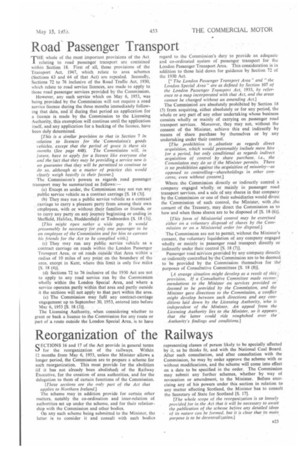Road' Passenger Transport
Page 57

If you've noticed an error in this article please click here to report it so we can fix it.
THE whole of the most important provisions of the Act relating to road passenger transport are contained within Section 18. First of all, those provisions of the Transport Act, 1947, which relate to area schemes (Sections 63 and 64 of that Act) are repealed. Secondly, Sections 72 to 76 inclusive of the Road Traffic Act, 1930, which relate to road service licences, are made to apply to those road passenger services provided by the Commission.
However, any such service which on May 6, 1953, was being provided by the Commission will not require a road service licence during the three months immediately following that date, and if during that period an application for a licence is. made by the Commission to the Licensing Authority, this exemption will continue until the application itself, and any application for a backing of the licence, have been duly determined.
[This is a similar provision to that in Section 7 in relation to licences for the 'Commission's goods vehicles, except that the period of grace is there six
months (See page 448). The Commission will, in future, have to apply for a licence like everyone else
and the fact that they may be providing a service now is no guarantee that they will be permitted to continue to do so, although as a matter of practice this would clearly weigh heavily in their favour.]
The Commission's powers as regards road passenger transport may be summarized as follows:—
(a) Except as under, the Commission may not run any public service vehicle as a contract carriage [S. 18 (3)].
(b) They may run a public service vehicle as a contract carriage to carry a pleasure party from among their own employees, with or without .their families or friends, or to carry any party on any journey beginning or ending in Sheffield, Halifax, Huddersfield or Todmorden [S. 18 (3)].
[This might open rather a wide gap. It would presumably be necessary for only one passenger to bean employee of the Commission and for him to canvass his friends for the Act to be complied with.]
(c) They may run any &bile service vehicle as a contract carriage on roads within the London Passenger Transport Area, or on roads outside that Area within a radius of 10 miles of any point on the boundary of the area, except in Kent, where this limit is only five miles [S. 18 (4)], (d) Sections 72 to 76 inclusive of the 1930 Act are not
to apply to any road service run by the Commission wholly within the London Special Area, and where a
service operates partly within that area and partly outside it the sections will not apply to that part within the area.
(c) The Commission may fufil any contract-carriage engagement up to September 30, 1953, entered into before May 6, 1953 [S. 18 (3)1.
The Licensing Authority, when considering whether to grant or back a licence to the Commission for any route or part of a route outside the London Special Area, is to have regard to the Commission's duty to provide an adequate and co-ordinated system of passenger transport for the London Passenger Transport Area. This consideration is in addition to those laid down for guidance by Section 72 of the 1930 Act.
[" The London Passenger Transport Area" and the London Special Area" are as defined by Section 107 of the London Passenger Transpott Act, 1933, by reference to a map incorporated with that Act, and the areas cannot be changed without an amending Act.] The Commission are absolutely prohibited by Section 18 (5) from acquiring, either absolutely or for any period, the whole or any part of any other undertaking whose business consists wholly or mainly of carrying on .passenger road transport services. Moreover, they may not, without the consent of the Minister, achieve this end indirectly by means of share purchase by themselves or by any undertaking under their control.
[The prohibition is _absolute as regards direct acquisition, which would presumably include Mere hire for a period, but only conditional as regards indirect acquisition of control by share purchase. i.e., the • Commission may do so if the Minister permits. There is no prohibition against the acquisition of minority—as opposed to controlling—shareholdings in other concerns,even without consent.]
Where the Commission directly or indirectly control a company engaged wholly or mainly in passenger road transport services, and a sale of any shares in that company by the Commission or one of their subsidiaries would divest the Commission of such control, the Minister, with .the consent of the Treasury, may direct the Commission as to how and when those shares are to be disposed of [S. 18 (6)].
[This form of Ministerial control may be exercised either on a voluntary disposal of shares by the Commission or on a Ministerial order for disposal.] The Commission are not to permit, without the Minister's
consent, the voluntary liquidation of any company engaged wholly or mainly in passenger road transport directly or
indirectly under their. control [S. 18 (7)]. •
. Passenger road serNiices provided by any ccimpany directly
or indirectly controlled by the Commission are to be deemeit to be provided by the Commissionthemselves for the purposes of Consultative Committees [S. 18 (8)]..
[A strange situation might develop as a result of this:,•:. provision. If a Consultative Committee made recont-: mendations to the Minister on services provided or deemed to be provided by the Commission, and the Minister gave directions to the Commission, a conflict might develop between such directions and any conditions laid down by the Licensing Authority, who is independent of the Minister. An appeal from the Licensing Authority lies to the Minister, so it appears that the latter could ride roughshod over the Authoriq's findings and conditions.]




























































































